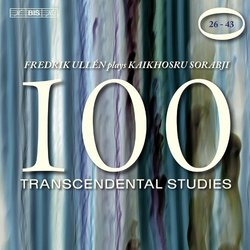| All Artists: Kaikhosru Sorabji, Fredrik Ullén Title: Kaikhosru Sorabji: 100 Transcendental Studies, 26-43 Members Wishing: 1 Total Copies: 0 Label: Bis Original Release Date: 1/1/2009 Re-Release Date: 8/25/2009 Album Type: Import Genre: Classical Styles: Chamber Music, Historical Periods, Classical (c.1770-1830) Number of Discs: 1 SwapaCD Credits: 1 UPCs: 675754017668, 7318590015339 |
Search - Kaikhosru Sorabji, Fredrik Ullén :: Kaikhosru Sorabji: 100 Transcendental Studies, 26-43
 | Kaikhosru Sorabji, Fredrik Ullén Kaikhosru Sorabji: 100 Transcendental Studies, 26-43 Genre: Classical
|
Larger Image |
CD Details |
CD ReviewsIncomparable B. F. Posner | New York, NY United States | 02/28/2010 (5 out of 5 stars) "I like listening to Sorabji's music. Ullen seems a first-rate performer. There are no other commercial recordings to compare this with. I commend Ullen for undertaking recording all 100 etudes, a 7+ hour odyssey." The Alkan of the 20th Century Michael Schell | www.schellsburg.com | 07/05/2010 (4 out of 5 stars) "The past decade has seen a flood of CD releases of the piano music of one of the 20th Century's most intriguing composers (an appellation for which there is plenty of competition). This CD is the continuation of Fredrik Ullén unfolding survey through this Liszt-inspired cycle of 100 Studies/Etudes.
Since the Studies lay unpublished and unknown for decades, there's relatively little written about them, so I encourage you to check out Ullén's own article on the Studies at the Sorabji Archive Web site. Their title and scope are obviously derived from Liszt and Alkan. Rhythmically, Sorabji's starting point is Chopin, in particular the perpetuum mobile of the last movement of the Second Piano Sonata, the concept of rubato and the penchant for runs of irregular "tuplets" in the right hand. Sorabji brings in the rhythmic/metrical extension of the 20th Century, often eschewing bar lines (like Ives). His harmonic vocabulary is that of classical modernism, ranging from more-or-less triadic sonorities (though these are usually chained together in a way that undermines any since of stabile tonality) through whole tone and quartal harmonies, to a favorite technique of runs in parallel dissonant intervals. Often an individual passage sounds like Scriabin or Debussy, or occasionally Ives at his most discursive and atonal, or someone like Ruth Crawford (e.g., the Study in Uneven Accents), though given the biographical timeline involved it seems unlikely that the latter two Americans could have been direct influences. In Sorabji's slow movements the phrases often ramble from motive to motive rather like Berg's. In his fast movements, the music often anticipates that of Messiaen or Cecil Taylor. I'm impressed simply at the effort required to find and write down out all those notes, decades before MIDI sequencers and music notation software made it easier. How good is this music? Well it's not the quality of the more distended classics of the 20th Century atonal piano literature (e.g., Messiaen's Vingt Regards, Copland's Piano Fantasy, Stockhausen's Klavierstüke X, etc.). It can be monotonous in rhythm, texture and timbre (Sorabji eschews the timbral effects developed for the piano in the 20th Century). And there's no one stylistic trait in his music that I find to be unique or particularly original (pretty much everything on this CD was done before or done better by a different composer). But the combination of Sorabji's inputs IS unique, along with the sheer audacity of projecting them onto this kind of scale. As a good but not great composer writing solo piano works of tremendous scope, Sorabji really does represent a 20th Century analog to Alkan. I think it's worth listening to these Studies, then immersing yourself also in one of Sorabji's works of greater continuous length, say, Opus Clavicembalisticum, or if you don't have time for that, something like the Concerto per suonare da me solo (which clocks in at a mere hour). A few hours with his music should be enough to reveal how intriguing his oeuvre is to its most fervent devotees. " |

 Track Listings (14) - Disc #1
Track Listings (14) - Disc #1